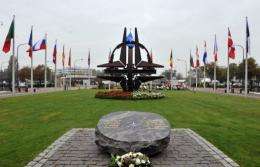NATO tackles cyber security at Tallinn meet

Three hundred global cyber experts gathered in Tallinn Tuesday for a NATO Cyber Conflict conference focused on the legal and political aspects of national and global Internet security amid a rise in attacks.
"The special focus at the conference this year is on generating cyber forces (...) the technologies, people and organisations that nations require to mitigate cyber threats that have been increasing with rapid speed," Colonel Ilmar Tamm, head of NATO's Tallinn-based Cyber Defence Centre told AFP as the forum got underway Tuesday.
According to Tamm, the Symantec cyber security firm recently reported that "web-based attacks in 2010 were up 93 percent from 2009."
"This calls for frameworks in both legal and strategic aspects which would guide the decision makers on how to act on these cases," Tamm said.
The Tallinn conference will coincide with a NATO defence ministers' meeting in Brussels where a new cyber defence policy for NATO will be adopted.
Meanwhile, at the third annual Tallinn meeting, experts from 37 countries are to share cutting-edge cyber security research, Tamm explained.
Among others, Ralph Langner, the German computer scientist who conducted much of the ground-breaking research on the Stuxnet worm, will present an analysis of what has been called the world's first cyber weapon.
Keir Giles from the UK Conflict Studies Research Centre is to analyze global cyber attacks from Russia and whether they can be seen as acting under a so-called Russian Cyber Command.
Talks will also focus on the recent US government decision to treat cyber attacks as military attacks and make relevant legislative changes.
"The support the US initiative has got in many other states, including Estonia and the UK, indicates nations’ increasing willingness to discuss military responses to cyber attacks," Tamm told AFP.
"With cyber incidents becoming more and more intrusive, it is a logical step for militaries to develop capabilities to counter cyber attacks and be prepared to engage in proportional response to cyber attacks," he added.
Though in practice, "it will be challenging to tailor a cyber response that would respect the rules of combat related to civilian objects and collateral damage," he added.
(c) 2011 AFP



















